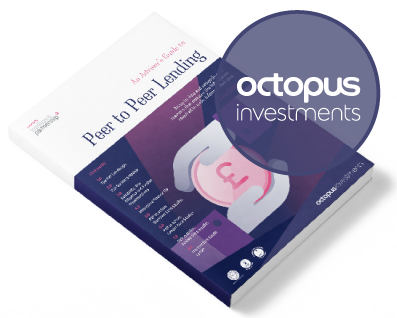An Adviser’s Guide to Peer to Peer Lending
Register for free and instant access to An Adviser’s Guide to Peer to Peer Lending

An Adviser’s Guide to Peer to Peer Lending
An up to date and impartial resource, providing practical guidance, true to life case studies and technical support on peer to peer lending.
What you'll find inside
Practical Guidance
Detailed overview of the various P2P business models and the technical complexities to be aware of
Case Studies
Real life examples of when and how P2P options can be used by investors and what they can achieve
Engagement
How advisers can integrate P2P lending into their proposition including input from advisers who have already done so
CPD Accreditation
Our guides are accredited by the CII, IFP and PFS. Give us feedback and don’t forget to claim your CPD!
Learning objectives
» Have an understanding of the different types of lending available
» Understand the pros and cons of typical P2P operating models
» Have an overview of P2P regulations and permissions
» Be aware of the business case for including P2P as an investment option, and where P2P may be useful in client portfolios
» Have an understanding of the risks of P2P investing
Acknowledgements
A guide like this is rarely the product of one organisation’s efforts: to ensure that it is up to date, comprehensive, accurate and captures all of the key issues requires an industry wide initiative.
We’ve had plenty of help producing this guide and would like to thank Gary Neild, Max Spurgeon and Graeme Stuart Gary Neild. Their input is invaluable, but needless to say any errors and omissions are ours.
Most of all we would like to thank our sponsor Octopus Investments. It would not be possible to produce educational material like this without their generous support and contribution towards the production, printing and distribution of the guide.
Brief Overview
Peer to peer lending has matured rapidly into a market that is not only attracting significant retail investment, but also huge engagement from institutional parties. It is fully regulated and well-placed to diversify portfolios with uncorrelated, fixed income that beats inflation, while often offering downside protection.
However P2P is not a homogenous asset class. There are different platforms, different operating models and different investment philosophies. There are also new terms to learn, new regulations for advisers to familiarise themselves with and new sources of data to investigate.
This guide is designed to help financial advisers and planners to get to grips with how P2P can fit into their service offering and what it can do for their clients.
![]()
In spite of its relative infancy, the P2P universe is already hugely diverse, spanning everything from unsecured credit card debt to secured residential property lending.
SAM HANDFIELD-JONES, HEAD OF OCTOPUS CHOICE
Comments on the P2P
![]()
With inflation eating away at deposit accounts, savers who are prepared to increase the level of risk may wish to consider peer-to-peer lending as a diversifier from the fluctuations of equity markets
Richard Nuttall, SimplyBiz
![]()
Peer-to-peer lending has brought about real benefits, not only for the UK’s small and medium sized business community, but our economy at large
Stephen Barclay MP, the Economic Secretary to the Treasury, December 2017
![]()
At a time when the approach of more traditional lenders, particularly to small businesses, comes under increasing scrutiny, the peer-to-peer lending sector has a positive story to tell which continues to drive marked levels of growth in borrower and lending volumes.
Robert Pettigrew, P2PFA, January 2018


